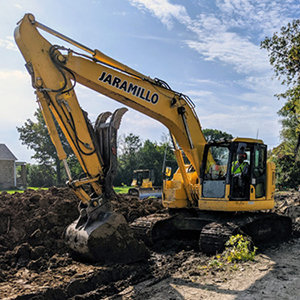Residential Excavating Ohio - Specialized Excavation for Ohio Homes
Residential Excavating Ohio - Specialized Excavation for Ohio Homes
Blog Article
Comprehensive Excavation Approaches: Understanding the Principles for Success
In the realm of building and construction and civil engineering, the importance of reliable excavation techniques can not be overemphasized. The mindful planning, specific execution, and careful focus to detail needed in excavation tasks require an extensive method that includes numerous basic aspects. From initial soil evaluation to the execution of security actions and routine development tracking, understanding these core elements is crucial for achieving success in any type of excavation undertaking. The real proficiency exists not merely in comprehending these principles however in flawlessly incorporating them to navigate the intricacies of excavation tasks with finesse.
Comprehending Excavation Task Planning

The initial stage of any type of excavation project is the preparation phase, where essential choices are made that can dramatically affect the end result of the project. Understanding the project timeline, budget plan, and range constraints is essential for producing a thorough excavation plan that guarantees the task's success.
One key aspect of excavation project planning is the development of a thorough timeline that outlines the sequence of landmarks, tasks, and deadlines. This timeline acts as a roadmap for the project group, allowing them to track development and make necessary adjustments to guarantee the job remains on timetable. Furthermore, a distinct spending plan that represents all expenses, consisting of devices leasing, labor costs, and products, is essential for preventing price overruns and hold-ups. By very carefully thinking about all these factors during the drawing board, excavation projects can be implemented successfully and efficiently, bring about effective end results.
Soil Analysis and Site Analysis
Performing thorough dirt evaluation and website assessment is a critical step in the preparation phase of any kind of excavation task. Dirt analysis involves establishing the structure, structure, and homes of the soil at the excavation website. This info is critical for comprehending the dirt's bearing capacity, wetness material, and capacity for erosion, which are key consider determining the excavation techniques and tools needed for the task.
Website evaluation surpasses dirt analysis and incorporates a wider assessment of the general site conditions. This assessment consists of recognizing any type of potential threats, such as below ground utilities, ecological concerns, or unpredictable terrain, that might influence the excavation procedure. By thoroughly examining the website, project supervisors can develop effective excavation approaches that prioritize safety and security, effectiveness, and environmental protection.
Making use of sophisticated technologies like ground-penetrating radar, soil sampling, and drone surveys can enhance the accuracy and effectiveness of soil evaluation and website analysis. Spending time and resources in these preliminary actions can inevitably conserve time and avoid expensive delays or problems during the excavation process.
Equipment Choice and Utilization
Effective excavation projects rely heavily on tactical devices option and application to guarantee ideal performance and efficiency. Selecting the best tools for the work is essential in maximizing effectiveness and decreasing downtime. Variables such as the kind of soil, depth of excavation, and project extent play a significant function in determining the most ideal equipment for the task handy.

Along with choosing the suitable devices, appropriate utilization is essential to task success. Operators must be trained to take care of the equipment safely and successfully - septic ohio. Normal upkeep checks and prompt repair services assist protect against break downs and ensure consistent efficiency throughout the project
Precaution and Laws Compliance
In the world of excavation projects, focusing on precaution and compliance with policies is critical to making certain a secure and legitimately audio more info here functional environment. Security measures encompass a variety of methods, consisting of carrying out you could try these out thorough site evaluations, applying correct signage and barriers, and offering sufficient safety training for all workers entailed in the excavation process. Adherence to guidelines, such as OSHA demands in the United States, guarantees that the excavation task fulfills the required requirements to protect employees, onlookers, and the surrounding environment.

Monitoring Development and Adjusting Strategies
Just how can project managers efficiently track the improvement of excavation tasks and adjust their strategies appropriately to enhance outcomes? Monitoring progression is necessary for making certain that excavation jobs stay on track and fulfill deadlines.

Verdict
To conclude, understanding the principles of detailed excavation strategies important site is essential for the success of any job. By understanding project planning, evaluating soil and site conditions, selecting ideal equipment, following safety laws, and monitoring development, project managers can make sure a efficient and smooth excavation procedure. Applying these methods will cause effective outcomes and reduce prospective risks or obstacles throughout the excavation job.
The preliminary stage of any excavation task is the planning phase, where critical decisions are made that can dramatically influence the outcome of the job. Understanding the project spending plan, extent, and timeline restraints is essential for developing a thorough excavation plan that ensures the job's success.
How can predict supervisors effectively track the development of excavation jobs and adapt their approaches appropriately to maximize outcomes? By carefully monitoring progression and being willing to adapt approaches, job supervisors can enhance the overall success of excavation tasks.
By comprehending task planning, examining dirt and site conditions, picking proper devices, complying with security guidelines, and checking development, job managers can ensure a reliable and smooth excavation process.
Report this page